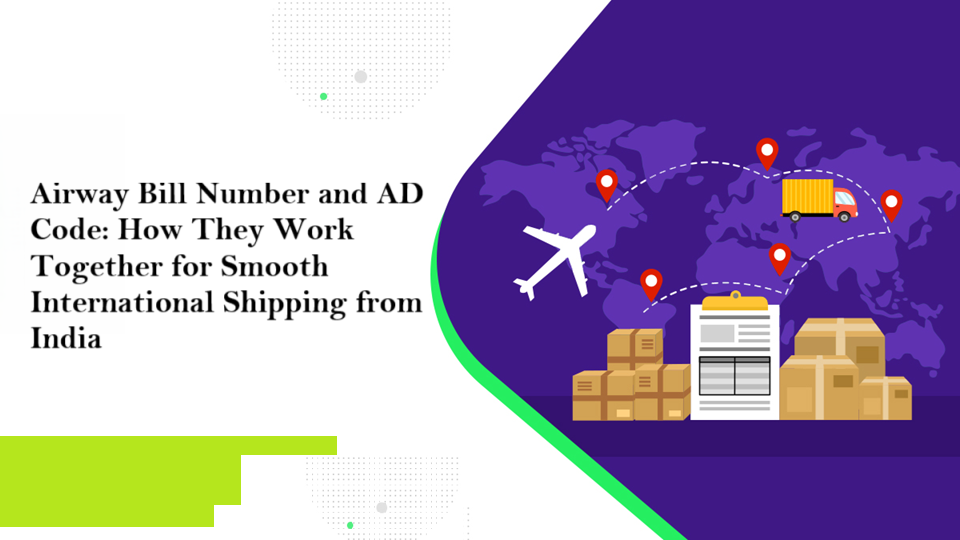Indian international shipping is a delicate dance of documentation, laws, and compliance procedures in order to have seamlessness in trade across the borders. Two of the important components of this operation are the Airway Bill Number and the AD Code. These factors have important roles to play in facilitating smooth logistics, ensuring compliance with Indian export regulations, and guaranteeing successful financial settlements. It is noteworthy that exporters, freight forwarders, and international trade firms understand how AD Code and the Airway Bill Number are a match made in heaven. This blog post explains why they are needed, what they do, and how they complement each other to facilitate international shipping from India without a hitch.
What is an Airway Bill Number
Airway Bill Number is a unique identifying number that is given to an Airway Bill (AWB), most important document utilized during air freight transport. Provided by an air carrier or forwarding organization, Airway Bill also is a carrier-agreement of carriage between the carrier and shipper and includes terms and conditions of export goods shipment abroad. The Airway Bill Number, which is predominantly an 11-digit number, is utilized in tracing shipment, verifying its details, and ensuring timely passage at any of the checkpoints involved, such as customs clearance and delivery.
Airway Bill Number is not only a tracking number. It is part of international trade documentation. It contains informative information like shipper and consignee information, goods description, weight and volume of shipment, and flight information. To Indian exporters, the Airway Bill Number is quoted while clearing customs as well as while filing regulatory, and hence it forms the foundation of the export process. By ensuring that the Airway Bill Number is recorded and communicated to all the stakeholders in a proper manner, exporters can ensure logistics delay avoidance and transparency at each level of the shipping process.
Understanding of the AD Code
AD Code, or Authorized Dealer Code, is a seven-digit alphabetic combination number that the Reserve Bank of India (RBI) gives to those banks which have been licensed to perform foreign exchange transactions. An AD Code is imposed on the account of the exporter and is applied for monitoring and regulating foreign exchange inflows and outflows on a corresponding basis with export transactions. An AD Code ensures each export proceeds repatriation back to India on a timely basis as per stipulated terms of time by the RBI under Foreign Exchange Management Act (FEMA).
An AD Code is an advance requirement prior to shipping abroad. The code is assigned to the bank account of the exporter and must be attached to major export documents, e.g., the Shipping Bill and Export Declaration Form. By equating the AD Code with transactions for exports, banks and the regulator can trace realization of payment by foreign customers in terms of FEMA regulations. The AD Code also permits reconciliation of export proceeds, thus allowing exporters to benefit from government schemes like the Duty Drawback Scheme or Merchandise Exports from India Scheme (MEIS).
Synergy between Airway Bill Number and AD Code
The AD Code and the Airway Bill Number combined facilitate international shipping out of India to be financially compliant and operationally efficient. While the Airway Bill Number deals with the physical movement of the products, the AD Code deals with the financial side of the export transaction. The combination forms a smooth pattern that covers the whole process of exportation, from the moment goods are shipped out from the exporter’s warehouse to the moment payment is received in the exporter’s account.
While the goods are shipped by air freight, the Airway Bill Number is produced during documentation. The AD Code is inserted into the Shipping Bill, which is a mandatory document to be submitted to Indian custom authorities to notify the export consignment. The AD Code, however, is quoted in the Shipping Bill to connect the export transaction with the bank account of the exporter.
Challenges and Best Practices
Though both Airway Bill Number and AD Code are so vital in their functions, handling both of them may be troublesome for exporters, especially those with no experience in international trade. Amongst the most frequently occurring issues is document errors, i.e., incorrect or poorly matched Airway Bill Numbers, which can cause delay in customs clearance or tracing of shipments. Likewise, not referring to proper AD Code in export documents can result in payment reconciliation issues or compliance issues. To avoid such risks, exporters need to make sure that the documents are properly checked before submission and Airway Bill Number and AD Code are entered correctly.
Another aspect of complexity is the complexities related to coordination among multiple stakeholders such as freight forwarders, airlines, customs houses, and banks. Proper coordination and communication are necessary to present the Airway Bill Number and AD Code at every step of the exporting process.
Indian International Shipping Role of Compliance
Compliance is a foundation for efficient international shipping from India, and the Airway Bill Number and AD Code are part of this. The Airway Bill Number makes product movement easier through international logistics channels, and the AD Code ensures export proceeds are remitted in accordance with RBI directions. They form a strong system which makes India an even stronger leader in global trade.
Conclusion
Airway Bill Number and AD Code are crucial to the Indian exporters in avoiding problems of international freight. The exporters can make their logistics seamless, comply with regulatory needs, and compete internationally by being aware of their roles and performing them accordingly. Their compatibility of Airway Bill Number and AD Code is an indication of synchronizing financial and logistics functions so that there can be free trade. With evolving global trade, Indian exporters who excel in these aspects will be well-positioned to thrive in the ever-changing world of international business.





